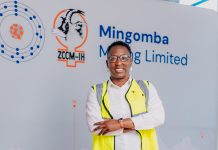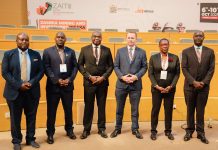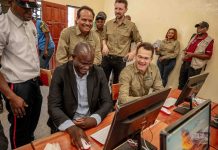“Nobody in today’s mining industry disputes the need to develop local input to the supply chain,” to use the words of Veston Malango, CEO of the Namibia Chamber of Mines, and a Zambian who grew up on the Copperbelt. The real question is, how do we successfully achieve it? Clearly, mines themselves need to be thriving in order for there to be a big enough marketplace for growing local supplies. This is where the previous Government’s draft ‘Local Content Regulations’ would have fallen flat, because the proposed law effectively mandated unbearable cost inflation for the mining industry, therefore imperilling its future and that of the local mine suppliers that the law was intended to nurture.
In contrast, Zambia’s newly-appointed Minister of Mines, Hon. Paul Chanda Kabuswe, has suggested that developing local inputs to the mining supply chain needs to be aligned with long-term thinking, rather than representing short-term responses to political requirements. Then the all-important question is, while mining is a powerful economic driver now, what will happen when mines inevitably close? The only truly sustainable approach for any mineral-rich country is to look beyond, to see whether the mining sector can also be a catalyst for the development of other sectors, so that they are thriving and creating jobs long before the mines eventually close.
The Kansanshi-funded Business Development Training Programme is one little-known initiative that, in several ways, exemplifies this kind of farsightedness. Kansanshi Mining Plc, majority-owned by First Quantum Minerals, has been funding this programme for the last eleven years. Mining For Zambia spoke to the programme’s coordinator, Mr Mukumbi Kafuta, and two participants with recent success stories to share.
***
The local Business Development Training Programme started as far back as June 2010 in Solwezi, Northwestern Province,” explains Mr Kafuta, Managing Director of Fortune World Investments, the company which is subcontracted by Kansanshi to run the programme. “Kansanshi, the management of Fortune World Investments, and the Northwestern Chamber of Commerce and Industry came together to see how we could come up with a suitable programme that would empower microentrepreneurs in the Solwezi district and surrounding areas,” says Mr Kafuta. Since the programme’s inception, almost 3,000 Zambian entrepreneurs have been provided with business skills to empower their success. Many others have benefitted indirectly through their employment by these businesses, which is one of the programme’s main objectives.
“We need businesses that are going to be sustained beyond the lifespan of the mines, so that one day when the mines close, we don’t have a ghost town,” says Mr Kafuta. “Instead, we will have businesses that are thriving, and industries that can actually continue with commerce and trade.” Supporting the creation of sustainable businesses is an objective which mirrors First Quantum Minerals’ own philosophy that, once it eventually ceases mining activity in North-Western Province, the communities living in and around its operations are left in a better position than when the mining company arrived.
“We need businesses that are going to be sustained beyond the lifespan of the mines, so that one day when the mines close, we don’t have a ghost town.”
Another of the programme’s key objectives is ‘formalisation’ of the businesses it supports, which involves registration with both the Zambian Revenue Authority (ZRA) and the Patents and Companies Registering Agency (PACRA). If an entrepreneur wishes to employ people, they are also required to register with a National Pension Scheme Authority (NAPSA). “Businesses that are formalised are considered to be more credible in Zambia, and are able to open business bank accounts for acquiring financial services such as loans or asset financing,” explains Mr Kafuta. “Recognition by government and other business entities also allows the entrepreneur to participate in the wider value chain, in terms of getting orders, tenders and other opportunities.” The Business Development Training Programme provides guidance on each of these steps.
From stagnation to expansion
When Ms Lufupa joined the programme in January 2021, she had been farming maize and beans and rearing chickens for several years, but a lack of financial management skills meant that, each month, she consumed all the proceeds from farming activities, leaving nothing to reinvest in the business. In March this year, armed with new knowledge about how to balance her books each month — and with the support of a network of participants in the training programme — Ms Lufupa embarked on a new free-range chicken rearing business, financed by a small clothing store that she’s been running in Solwezi’s town centre for two years.
Among the changes she’s implemented to her chicken rearing business are allocating funds to purchasing specialised feed for boosting egg production, and paying to have the eggs incubated at a cost of K5 per egg. Knowing exactly how much investment is required to support a continuous cycle of laying and hatching eggs and growing chickens for sale has empowered Ms Lufupa to make plans for expanding her business, which include acquiring her own incubator.
Ms Lufupa’s clothing store has also been propelled to new heights. Inspired by the training she’s received, she has successfully formalised her business, and even employed a salesperson. Furthermore, she decided to open a second store earlier this year from the new-found profits she has generated.

Managing time so it doesn’t manage you
Mr Alex Shindikinya, a 43-year-old grocery store owner, has also already applied many of the skills he’s acquired since joining the programme earlier this year, and his efforts have been rewarded. “Some of the key skills I’ve learned since starting lessons with Fortune World Investment in February 2021 are learning how to manage time, manage money, and keep records.”
In just a few short months, these newly learned skills have already transformed his business. Prior to attending training sessions, Mr Shindikinya did not have a fixed opening time for his grocery store, and his business had not seen any tangible growth since 2007. After doing market research on when the peak hours of demand are, he realised he was missing out on early shoppers who were going to nearby competitors before he had opened. Adjusting his hours to catch both early and late shoppers – and ensuring that his operating hours are consistent — has been a game-changer, and his earnings have risen from an average of K900 to K3,000 daily.
Mr Kafuta also attributes Mr Shindikinya’s increased daily takings to new awareness of the importance of customer relations, which is one of the topics covered in training sessions. “Participants learn to realise that the customer is king, and should therefore be treated as such,” he says. “Mr Shindikinya has enhanced his level of customer care by doing things like paying attention to customers’ needs, having a cheerful attitude at all times, and promptly attending to queries or complaints. In so doing, his customers are more satisfied and therefore he has seen an increase in the number of both new and repeat customers.”
Learning to reduce his expenses has also been pivotal in enabling Mr Shindikinya to grow the business’ capital from approximately K21,000 to K50,977 between April and July 2021, substantially beating his target of K30,000.
“Opening an outlet at Mitech is in my business plan, and I will start doing market research after my evaluation on 3 October,” he explains. This research will involve getting an understanding of who his competitors are, customers’ buying trends, and what gaps can be identified in the market. The “evaluation” in October to which Mr Shindikinya refers will be carried out by Fortune World Investments’ Mr Kafuta, who has found mentoring sessions in the form of field visits to be very helpful for entrepreneurs in the programme.
Adapting to new challenges
When, without warning, COVID-19 threatened all the momentum that the programme had gained in the last ten years, neither Fortune World Investments nor Kansanshi Mining Plc were deterred. Having previously held training sessions in-person at a local venue, it was decided that bringing crowds of people together was a COVID-19 transmission risk. Mr Kafuta began broadcasting the training sessions online and, for the many Zambians without internet access in the areas surrounding Solwezi, via radio too.
The mining company was able to share the experience that its Kansanshi Foundation has gained through ‘School-on-Radio’, a partnership with the Solwezi District Education Board that ensures children in rural areas are not left behind because of an unfortunate combination of school closures and lack of internet access. It was, in fact, while listening to Solwezi FCC Radio one day in February, that Mr Shindikinya first learnt about the Kansanshi-sponsored programme, and he has been setting time aside to listen to both the Kikaonde and the English versions of the training session to enhance his understanding since then. The programme is now aired four times a month on the local Solwezi station, Beats FM Radio 88.1.
“Radio broadcasts are a very, very good method of learning because I can learn via radio and my business doesn’t lose even a single cent.”
‘Business on Radio’
“Radio broadcasts are a very, very good method of learning for one simple reason,” says Mr Shindikinya. “Every month, I spend eight hours learning on radio at my shop, and at the same time I am working and selling goods. My daily sales for June were K3000 from 07h20 to 19h00, which means that if I closed my shop for eight hours per week to attend lessons somewhere else, I would be losing K2,000 a week. This way, I can learn via radio and my business doesn’t lose even a single cent.”
Mr Shindikinya’s success so far has come down to plenty of hard work and diligence in both studying and applying his newly-learned skills. He has attended radio lessons on 12 different topics so far, from ‘identifying market opportunities’ to ‘why businesses fail’, and he has established a routine that includes reviewing all handouts, which he receives electronically.
“The advantage of having radio training is that there is a wider area of coverage, and therefore there are more beneficiaries,” says Mr Kafuta. “We allow callers to phone in with questions (by giving us a missed call 30 minutes before the programme) which we endeavour to answer as effectively as possible, for the benefit of the wider business community. Some of the participants now have limited companies, and others have business names; the programme has been a great success, as measured by the training objectives we’re able to achieve.”
The beauty of this set-up is that, once Kansanshi has subcontracted the trainers and covered the costs of the airtime, there is no limit to the number of people who can benefit. And, for a mining company whose goal is supporting the creation of sustainable livelihoods beyond mining – not funding an arbitrary number of people’s training, or tallying up the boxes that its social initiatives check – the amplifying effect of radio is first prize.
See also: School must go on


























